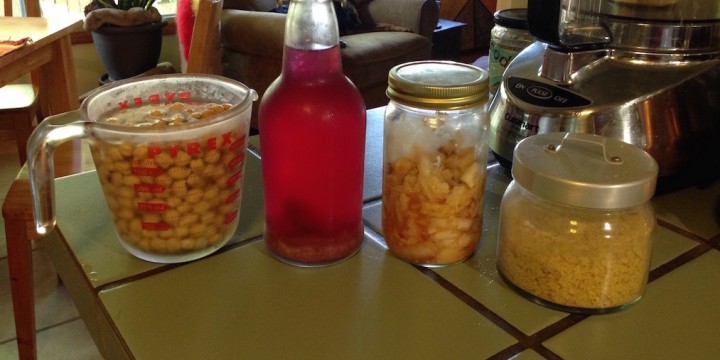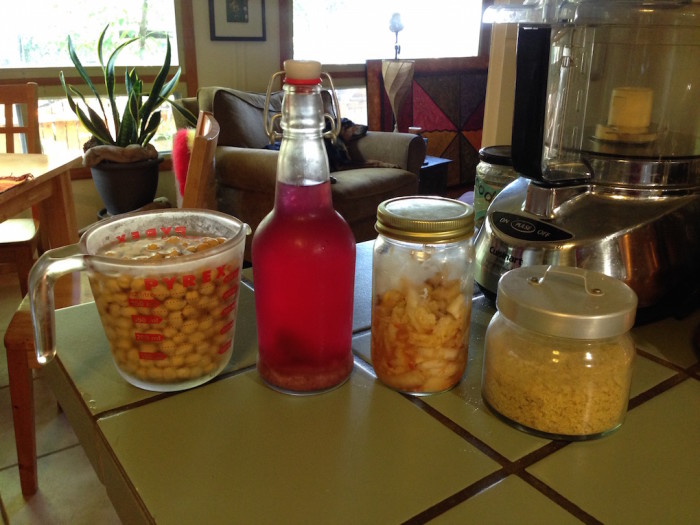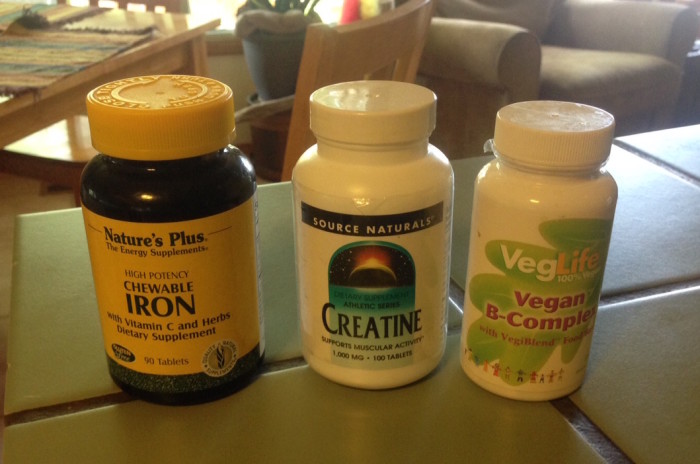
Vegan Supplements
- June 2015
- Vegan
Hya…I hope you don’t mind me asking you a quick question but do you have any problems at all following your openly publicized vegan diet? do you need supplements and have to be super careful with what you eat? I’ve preferred a “vegetarian” diet (with seafood) for most of the last 10 years, but then came across some research about possible bone problems/complications with such a diet…leaving me a little bit bemused and uncertain.. if I could eat clean I’d be less mean…that’s my feeling and so I ask those with good experience if it’s all good sometimes : )
All the best
Lee
Hi Lee,
I’ve been vegan since 2003. I always emphasize that I eat a simple, whole foods diet which is also plant based. You could be vegan by eating frozen pizza without cheese and white bread with Jiffy peanut butter and grape jelly, and this would not be an ideal diet for health and athletic performance, so there’s a very important distinction there! Just as important (or even more important), I eat almost no refined sugar or refined grains (white flour, white rice, white pasta) and I drink very little alcohol and occasional decaf coffee. So though I usually call my diet “vegan”, more specifically it’s an eating style of eating real, whole vegetables, fruits, nuts, legumes and grains and avoiding refined sugar and processed foods. And big focus on hydration, hydration, hydration!
There are a couple of supplements I use, but also some dietary staples which have important roles in my health and nutrition.

In the last year I’ve been brewing my own kombucha (which does use some sugar, but a pretty minimal amount), and making kimchi (I will post that recipe up soon!). I’ve been doing research on the microbiome, probiotics and fermented foods, and I eat my own kimchi most every day and drink my own kombucha a few times a week. Most American diets (vegan or not) lack fermented foods and B vitamins. I take a vegan B supplement daily, and I eat nutritional yeast on everything I make for dinner (salad, stir fry, brown rice pasta, soup). I also take creatine (2-3 grams/day). About once a week, I’ll take an iron supplement that has vitamin C in it, which helps with absorption.

I also read and heard about bone density issues for vegans. In 2009 I had ACL surgery, and when I was at the orthopedic center in Salt Lake City, I asked if I could have a bone density test because I’d been vegan for 6 years and I was curious if my bone density was low. My left ACL had been torn for almost 2 years, and I’d been compensating by always taking impacts on my right leg and guarding the left leg. The bone density results showed that my left side (with the injured knee) was normal bone density, while my right side (the noninjured knee) was above average. There are studies showing that although dairy products have a lot of calcium, eating them does not necessarily guarantee absorption into your bones and there are negatives associated with eating dairy products. Tofu, broccoli, tempeh, greens and almonds are all absorbable calcium sources. The role of exercise is just as important for bone density–as I saw in the difference between my normal versus above average bone density on my injured versus noninjured sides. I did have a bone density test again in 2014 after my knee was fully recovered for several years, and it showed above average bone density on both sides.
Protein is a consideration for my meals, especially dinner, but not an obsession. I make sure all my dinners have quinoa, tofu or beans in them (for example, sauteed tofu cubes or garbanzo beans, and sunflower seeds or pumpkin seeds when dinner is a big salad, or stirfry on a bed of quinoa instead of rice if there’s no tempeh, tofu or garbanzos–just always making sure there’s a protein involved somehow). And I also make sure all my dinners have a green vegetable in them–if there’s no green vegetable, it’s not dinner in my book: broccoli, kale, chard or asparagus. I try not to eat canned beans, as I’ve heard enough from microbiologist friends to try to avoid cans completely. It’s pretty easy to get in the habit of soaking beans the day before (I usually keep them in the fridge when soaking), and cooking them in a pressure cooker or a regular pot the next day. You can keep your cooked garbanzos or other beans in the fridge and add them to salads, stirfrys, soups, wraps or sandwiches, or make hummus or quinoa salads out of them for eating at the crag or on the go.
You might be kidding about being less mean through your eating habits, but I personally noticed that I became less aggressive and noticed reduced tendencies toward anger when I stopped eating meat. This may be because there are so many hormones and antibiotics in the majority of factory-farmed meat products that Americans are eating in restaurant and grocery store-purchased meat products, and because muscles are flooded with adrenaline when a creature is killed in a high stress, violent manner which is what generally happens in slaughterhouses. All of these substances are ingested by the eater who consumes the carcass.
On a spiritual level, I feel more peaceful by making an effort to reduce the violence that is within my means to reduce, so I actually do think that changing your eating habits can change your feelings of wellbeing as well as your physical health. Those changes can be small, or they can be drastic. Any considered, healthy change is good, and starting with baby steps is often the best way 🙂 In my view, there is no separation between spiritual, emotional, physical and athletic health–this is what we learn from rock climbing and from yoga. Our physical appearance and athletic performance are what we see on the outside and so that’s where most of the attention gets directed. But what’s on the inside is even more important, especially as we develop and move through life, and this is what we learn from studying the microbiome and from meditation.
Best of luck with your research and your good eating!
Steph








This is a really interesting post for me at the moment, thanks for writing it! I have been vegetarian since my teens with no health issues (most associated with vegetarianism or veganism are complete misconceptions anyway) but recently started reducing my dairy intake along with being more conscious about eating more nutritious and real foods. I’ve noticed I feel a lot better generally in my energy, mood and training. I was also thinking about supplements as I am starting to train more seriously so I am looking into what’s available here in the UK…at the moment I take a vegetarian multivitamin with iron but I have been looking at adding in more B vitamins as I reduce dairy.
Hi Katie,
I don’t like to take a lot of supplements, but I think the B vitamins are really important for everyone. Also, look into the creatine: all my research has shown a lot of benefits with few to zero negatives for an increase in strength and mental alertness. Recently I read a very interesting study about Siberian Ginseng/eleuthera, which has been used by local mountaineers for some time and has recently been shown through research to increase endurance and strength in runners and cyclists over 8 weeks of use. So I’m interested in trying it out for 2 months to see how that feels. https://www.mountainroseherbs.com/products/eleuthero-root-powder/profile
Hi Steph and Katie,
I have been vegetarian for 20 years and vegan for about 4 and studied a lot about food. it is very important to get enough B12 vitamin into the body. http://www.samahitaretreat.com/vitamin-b12.html . a couple days ago I came across of this video: https://www.youtube.com/watch?v=FnwIKZhrdt4. it is really informative. I take raw code vitamines , for me are the best http://www.thevitamincode.com
Best regards from Slovenia and sorry for my bad english.
Tamara
[…] Vegan Supplements | Steph Davis – High Places […]
Just a quick and sincerely respectful note, my understanding is that there is no vegan source for vitamin B12. Perhaps this is inconsequential for some people; it would not be for me, though, or for many. Just FYI.
Yeah, the B vitamins seem to be real important for vegans but I am concerned about ingesting synthetic B vitamins, in vitamin pills. Even the “food based” B vitamins are grown with synthetic vitamins, and all nutritional yeasts are grown with synthetic vitamins. Even the un-fortified nutritional yeasts are still grown using synthetic vitamins, it is just that the vitamins are not added back in to the product at the end stage of production, and the company can therefore claim it is not “synthetically fortified.” I tend to think these synthetic vitamins are simply “drugs”, even if over the counter. Maybe B12 is safe and natural, not totally sure on that one.
this vitamin b12 is raw vegan: http://www.iherb.com/Garden-of-Life-Vitamin-Code-Raw-B-12-30-Vegan-Caps/15848 ( i do not advertise it but for me is really the best)
I still don’t get how they’re synthesizing the B12 from vegan sources; but in any case am glad that it’s working well for you.
Thanks for sharing all of this information with us, Steph! I’ve been vegan for 6 years now, but within the last month stopped eating refined sugar and most processed foods, opting for a more whole foods diet. It was tough at first (I also gave up caffeine at the same time – yikes!), but over three weeks in, I feel amazing. I’m sleeping better and I’m less anxious. My running is getting to a whole new level. Definitely the way to go! ~ Jessica
[…] have noticed improvements in both power and endurance since adding creatine and eleuthero to the few supplements I like to use. I don’t like to take a ton of supplements, but when I really see results from something I do […]
Hi Steph, this is all really interesting and I am going to try Siberian Ginseng. Wondered if you’d managed to get time to post the recipe for kimchi? Thanks heaps